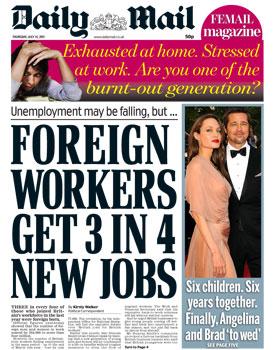First, a breakdown of those acronyms:
HS2 = High Speed 2, a proposed high speed rail link that will directly London Euston to Birmingham, then later to Manchester (and Leeds).

WCML = West Coast Main Line, an existing rail link connecting London Euston to Birmingham and Manchester (and than up to Scotland). It also has stations at many other places in between. It's the most important railway line in the UK.

FPTP = First Past The Post, the electoral system used for general elections. The UK is split up into 600 constituencies, and each elects a single MP with the most votes. Most constituencies are safe seats where the same party always wins, but a few are marginal seats where the constituency frequently changes hands. It's the marginal seats which pick who governs, so the views of the swing voters here count more than anywhere else.
There is a big dispute over whether or not HS2 should be built. Opponents point to its £30bn price tag and the damage it will do to the countryside. Proponents emphasise the prospects for
The WCML carries all sorts of trains. As well as some services stopping at the towns on its path, it is used for the current fastest services from the major cities to London. The diagram below shows a typical hour use of the line.

The key thing to note is how many trains full of intercity passengers zoom straight past places like Crewe, Rugby, Northampton, Milton Keynes and Watford. HS2 provides a better alternative for these trains, freeing up capacity for trains to serve large towns. It is in the self-interest of people in these towns to see HS2 built.
The people whose self-interest is not served by HS2 are the people who live in the small towns and rural areas that the line will speed through but not stop anywhere near. However I'm unaware of the proposed HS2 route going anywhere near a marginal seat. The route seems to be entirely through Tory safe seats.
Conversely, the WCML-served
Crewe,
Rugby,
Northampton,
Milton Keynes and
Watford are all towns containing marginal seats. So in order to gain power, it is in the self-interest of politicians to prioritise the views of residents of these places at the expense of the residents in safe seats.
To the lobbyists campaigning for HS2's construction, I'd be making sure that the residents of the WCML towns are aware of the benefit HS2 will bring them. The politicians will respond accordingly.



